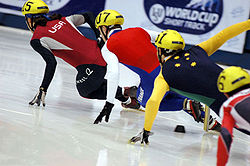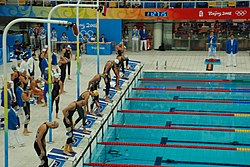| This article needs additional citations for verification. Please help improve this article by adding citations to reliable sources. Unsourced material may be challenged and removed. Find sources: "Racing" – news · newspapers · books · scholar · JSTOR (January 2010) (Learn how and when to remove this message) |
 Two men engaging in a sprint finish at the end of a 5-kilometre road running competition
Two men engaging in a sprint finish at the end of a 5-kilometre road running competition The Men's lightweight coxless four rowing race at the 2012 Summer Olympics in London
The Men's lightweight coxless four rowing race at the 2012 Summer Olympics in London The start of the 2018 Austrian Grand Prix auto race
The start of the 2018 Austrian Grand Prix auto race Two women in a tight sprint finish at the end of the Australia World Cup cycling race
Two women in a tight sprint finish at the end of the Australia World Cup cycling race Horse racing at Arlington Park
Horse racing at Arlington Park Cross-country skiers racing at the Demino Ski Marathon, March 2015
Cross-country skiers racing at the Demino Ski Marathon, March 2015 Short-track speed skaters racing through a curve
Short-track speed skaters racing through a curve Start of the 4 × 100 meters relay swimming race during the 2008 Summer Olympics in Beijing
Start of the 4 × 100 meters relay swimming race during the 2008 Summer Olympics in Beijing
In sports, racing is a competition of speed, in which competitors try to complete a given task in the shortest amount of time. Typically this involves traversing some distance, but it can be any other task involving speed to reach a specific goal.
A race may be run continuously to finish or may be made up of several segments called heats, stages or legs. A heat is usually run over the same course at different times. A stage is a shorter section of a much longer course or a time trial.
Early records of races are evident on pottery from ancient Greece, which depicted running men vying for first place. A chariot race is described in Homer's Iliad.
Etymology
The word race comes from a Norse word. This Norse word arrived in France during the invading of Normandy and gave the word raz which means "swift water" in Brittany, as in a mill race; it can be found in "Pointe du Raz" (the most western point of France, in Brittany), and "raz-de-marée" (tsunami). The word race to mean a "contest of speed" was first recorded in the 1510s.
A race and its name are often associated with the place of origin, the means of transport and the distance of the race. As a couple of examples, see the Dakar Rally or the Athens Marathon.
Forms
Further information: List of forms of racingRunning a distance is the most basic form of racing, but races may also be done by climbing, swimming, walking, or other types of human locomotion. Races may be conducted with animals such as camels, dogs, horses, pigeons, pigs, snails, or turtles. They also may be done in vehicles such as aircraft, bicycles, boats, cars, or motorcycles; or with another means of transport such as skates, skateboards, skis, sleds, snowboards, or wheelchair. In a relay race members of a team take turns in racing parts of a circuit or performing a certain racing form.
Orienteering races add an additional task of using a map and compass to navigate from point to point in diverse and usually unfamiliar terrain.
A race can also involve any other type of goal like eating. A common speed eating challenge is a hot dog eating race, where contestants try to eat more hot dogs than the other racers.
Racing board games and racing video games are also competitions of speed.
Racing can also be done in more humoristic and entertaining ways such as the Sausage Race, the Red Bull Trolley Grand Prix and wok racing. Racing can be entertained from around the world.
Sprint finishes
A sprint finish is a racing tactic used in many forms of racing where a competitor accelerates towards top speed in the final stages of a race. This tactic is mostly associated with long-distance forms of running and cycling, which often feature large groups of competitors racing at a slower pace for much of the race – this slower aerobic racing allows for the subsequent anaerobic activity required for sprinting. The tactic relies upon keeping greater energy reserves than your opponent until the last part of the race in order to be able to reach the finish point first. It is the opposing tactic to keeping a steady optimal pace throughout a race to maximise your energy efficiency (see running economy).
In track and field, distances from 1500 metres upwards often feature sprint finishes. They can also be found in cross country and road running events, even up to the marathon distance. A runner's ability to sprint at the end of a race is also known as their finishing kick. Multisport races, such as the triathlon, often have running as the final section and sprint finish tactics are applied as they are in running-only events.
In cycling, sprint finishes are an integral part of the sport and are used in both track cycling and road cycling. Cycling sprints are often highly tactical, particularly on the track, with cyclists occasionally coming to a near halt at points before reaching a high speed finish. The longer track races such as scratch races often feature sprint finishes, as maintaining a steady pace within the peloton allows opponents to conserve energy through drafting. Road races are similar in this respect, in both short criterium races and long-distance races. Sprint tactics also form a major part of points classifications in road events, where cycling sprinters specialise in reaching an intermediate point first, thus gaining extra points and resulting prizes.
Sprint finish tactics are also used in speedskating, cross-country skiing, long-distance swimming, horse racing and other animal racing sports. The finishes of races which are outright sprinting events in themselves, such as the 100 metres track race, are not normally referred to as sprint finishes, as all competitors are already sprinting by default (thus it is not a racing tactic).
See also
- List of films about bicycles and cycling
- List of films about horse racing
- Sport
- Gambling
- Totalisator
- Pacemaker
- Nuclear arms race
- Space Race
References
- "Online Etymology Dictionary". Online Etymology Dictionary. Archived from the original on 15 August 2017. Retrieved 28 June 2010.
- "Race". Online Etymology Dictionary. Archived from the original on July 17, 2017. Retrieved July 13, 2012.
- Ronald J Maughan, & Michael Gleeson (20 May 2010). "Energy Supply" 404 Archived 2023-02-27 at the Wayback Machine. The Biochemical Basis of Sports Performance (pg. 129). Oxford University Press. ISBN 9780199208289
- Stevenson, Roy. Developing a fast finish for your road races 404 Archived 2014-04-19 at the Wayback Machine. Multi Briefs. Retrieved on 2014-04-17.
- Fitzgerald, Matt (2013-11-18). Kick Your Way To Better Race Times Archived 2014-04-19 at the Wayback Machine. Competitor. Retrieved on 2014-04-17.
- Stevenson, Roy (2013-07-13). Developing a fast finish 404 Archived 2017-02-22 at the Wayback Machine. Triathlon & Multisport Magazine. Retrieved on 2014-04-17.
- The individual sprint Archived 2006-11-16 at the Wayback Machine . BBC Sport 404. Retrieved on 2014-04-17.
- Scratch Race Archived 2014-04-18 at the Wayback Machine. Cycling Calendar. Retrieved on 2014-04-17.
- Gitz, Jarred (2014-04-05). The Points Classification Archived 2014-04-19 at the Wayback Machine . Jareds Cycling. Retrieved on 2014-04-17.
- Smith, Mark (2008-05-01). Technique: Sprint finishing Archived 2014-04-19 at the Wayback Machine. Bike Radar. Retrieved on 2014-04-17.
- Open Water Swimming Archived 2014-04-19 at the Wayback Machine. Masters Swimming. Retrieved on 2014-04-17.
- Minella best in sprint finish 503 Archived 2014-04-19 at the Wayback Machine. British Horse Racing Authority. Retrieved on 2014-04-17.
- James, Dave (2014-02-24). Matt breaks record as doping hits Sochi Archived 2014-04-19 at the Wayback Machine. China Post/Agence France Presse. Retrieved on 2014-04-17.
External links
| Racing | ||||||||||
|---|---|---|---|---|---|---|---|---|---|---|
| Running |
| |||||||||
| Orienteering | ||||||||||
| Bicycle racing | ||||||||||
| Animal racing | ||||||||||
| Swimming | ||||||||||
| Climbing | ||||||||||
| Motor racing |
| |||||||||
| Board racing | ||||||||||
| Winter racing | ||||||||||
| Multi-sport racing | ||||||||||
| Orienteering | |||||||||
|---|---|---|---|---|---|---|---|---|---|
| Sport disciplines |
| ||||||||
| Equipment |
| ||||||||
| Software |
| ||||||||
| Video games | |||||||||
| Fundamentals | |||||||||
| Organisations / lists | |||||||||
| Non-sport related | |||||||||
| Competitions |
| ||||||||

